 Abraham Lincoln
If given the truth, the people can be depended upon to meet any national crisis...
Abraham Lincoln
If given the truth, the people can be depended upon to meet any national crisis...
 Guildford news...
for Guildford people, brought to you by Guildford reporters - Guildford's own news service
Guildford news...
for Guildford people, brought to you by Guildford reporters - Guildford's own news service
We Get Most of Our News From Social Media, Say Surrey Students
Published on: 6 Feb, 2021
Updated on: 10 Feb, 2021
A survey conducted by a student at the University of Surrey has produced some revealing findings on how they access news.
Daniel Bushell, who writes occasional articles for The Guildford Dragon NEWS, said: “I decided to promote the survey on social media platforms such as Facebook and Instagram because it was the best way to get the largest pool of data, considering Covid-19 restrictions and lockdown.
So data concerning social media may be skewed since this is how most people accessed it. But this is a group of people who generally all use these platforms daily anyway, so it probably had a minimal impact.
I expect some might find some of the findings surprising.
Daniel’s first question asked which sources the students used for news.
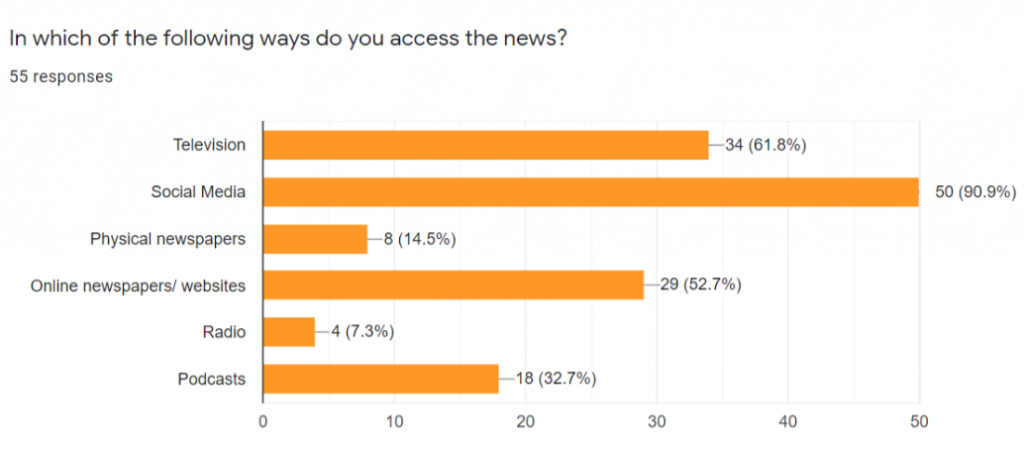 90% of the students said that they used social media 90% of the time to access news. Only 15% read physical newspapers while 30% read online newspapers and websites such as The Dragon.
90% of the students said that they used social media 90% of the time to access news. Only 15% read physical newspapers while 30% read online newspapers and websites such as The Dragon.
Nearly two-thirds of the respondents found social media the easiest to access while newspapers, radio and podcasts hardly registered.
Cameron Heasman, who is on a chemistry placement, asked why he found physical newspapers to be difficult to access, said: “Ignoring the whole coronavirus thing, a lot of the time it’s just easier to read the news on our phones or TV. I think newspapers will be phased out in the near future because I don’t know anyone our age who still reads them. Plus, you have to pay for them.
 About half the sample said they were equally interested in global and local news. Of the remaining half about one third was more interested in local news.
About half the sample said they were equally interested in global and local news. Of the remaining half about one third was more interested in local news.
Lucy Coates, a first year law student, said: “Since the pandemic started, I’ve started to see things from a bigger picture. Most local news seems to be pretty pointless compared to what’s happening around the world. Like, I don’t think finding out about a woman who grows her own vegetables is that important compared to disasters like the wildfire at the start of last year. It just doesn’t seem as worth my time.”
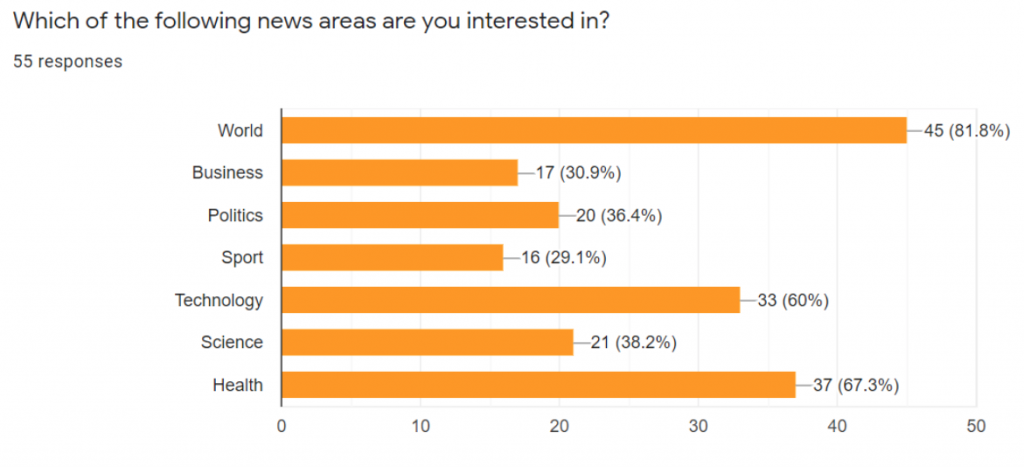 And the interest in global news was reinforced by the answer to questions about which news subject interested the students most, the world, technology and health being the most popular, with business and, perhaps surprisingly, sport, the least.
And the interest in global news was reinforced by the answer to questions about which news subject interested the students most, the world, technology and health being the most popular, with business and, perhaps surprisingly, sport, the least.
Ms Coates thought that was definitely because of Covid. “Knowing about new strands or what’s happening on the other side of the world is way more important than things like sports, which you can’t even see in person anymore. I think more people are just looking at the bigger picture.”
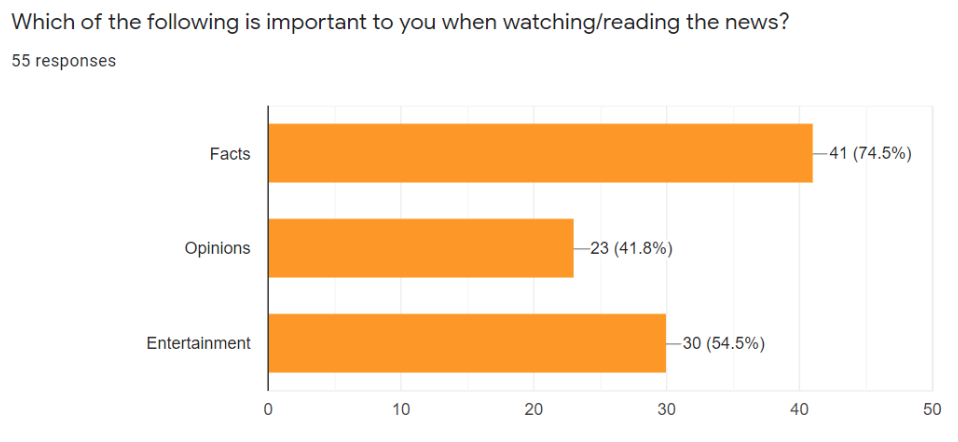 Factual content was said to be the most important part of news coverage by 41% of the respondents although Eniola Usmal, a second-year physics student had little faith in the reliability of ‘facts’ presented by the news? She said: “You can’t trust anything on the news, so you just have to take things with a grain of salt. I’d rather know more facts so I can come to my own conclusion.”
Factual content was said to be the most important part of news coverage by 41% of the respondents although Eniola Usmal, a second-year physics student had little faith in the reliability of ‘facts’ presented by the news? She said: “You can’t trust anything on the news, so you just have to take things with a grain of salt. I’d rather know more facts so I can come to my own conclusion.”
There was also scepticism about the value of edited news. Cameron Heasman said: “I mean, it’s true that social media news is mostly biased, but isn’t that the same with most other news sources?
“I don’t think it’s possible to read something completely balanced, so you just have to look at most articles cautiously. Plus, with access to the internet, you’ll read more into something than if you just read it in a newspaper, since you have instant access to that information.”
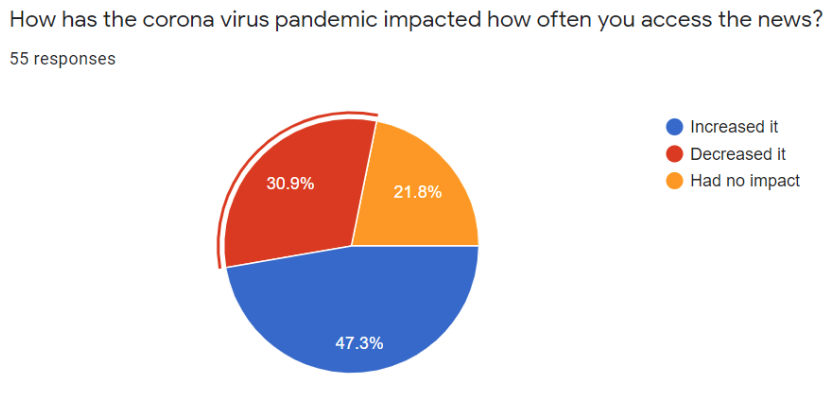 Asked whether the pandemic had increased or decreased their appetite for news nearly half thought it had increased but nearly a third thought it had decreased.
Asked whether the pandemic had increased or decreased their appetite for news nearly half thought it had increased but nearly a third thought it had decreased.
Harry Caudwell, a second year criminology student said: “I watched the news on TV a lot last year, at the start of the first lockdown, but now, that’s all that’s really talked about. Honestly, seeing the death toll every day isn’t interesting, it’s just depressing.”
About the sample:
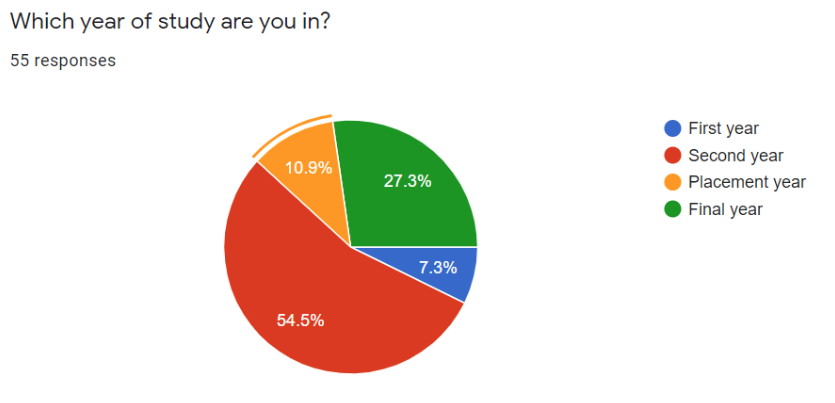 Over half of the sample were in their second year and just over a quarter in their final year.
Over half of the sample were in their second year and just over a quarter in their final year.
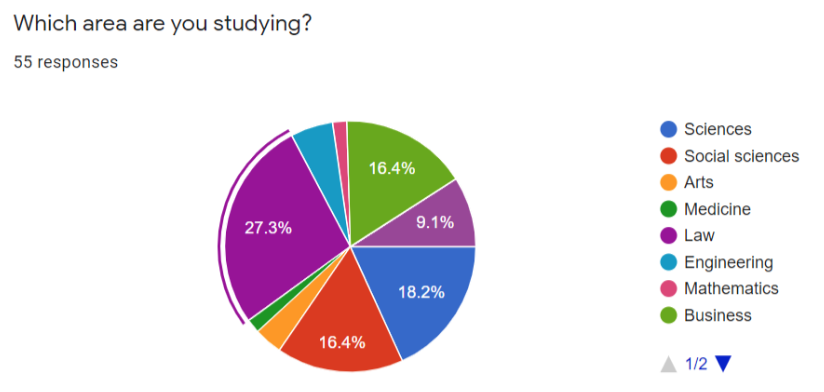 The students came from a wide range of disciplines.
The students came from a wide range of disciplines.
 By Dragon editor, Martin Giles
By Dragon editor, Martin Giles
Daniel has produced a useful survey which confirms the trend towards using social media for news by younger generations. It is not surprising, given the easy access, as reflected in one of the answers. It is worrying that regulated news, and stories that have gone through an editing process, are not more highly valued.
The problems social media information can cause have been fully exposed in America recently and they are at play here too. Some politicians have succeeded in persuading large sections of the population that the media is generally a less reliable source of information than politicians who many would regard dishonest.
And social media can be a double-edged sword. We have seen MPs, including our own Angela Richardson, close their Twitter accounts because of the nasty behaviour of a minority.
Here at The Dragon, we believe this vindicates our decision, taken at the outset, not to publish anonymous comments. If the social media platforms verified the identity of all account holders it would probably change behaviours radically.
Our freedom of speech is precious but we have to be responsible for what we say.

See Dragon story: GBC’s Explanation of Major Land Sale Notice Error ‘Borders on Arrogant’ Says Councillor






Recent Articles
- Guide to Telephone Befriending Services for Older People
- Stage Dragon: Sleuth at the Yvonne Arnaud Theatre
- Guildford Lido All Set for the 2024 Season
- Appointment of Permanent Joint Strategic Director of Finance Confirmed
- Police and Crime Commissioner Candidate Interview – Alex Coley
- New Approach to Mental Health Concerns Reported to the Police
- Letter: Bernard Quoroll ‘s Insight Should Be Heard
- Police and Crime Commissioner Candidate Interview – Paul Kennedy
- Staff Union Warns Surrey University of No Confidence Votes
- Invitation to Join Mass Bike Ride on Saturday, April 27


Search in Site
Media Gallery
Dragon Interview: Local Artist Leaves Her Mark At One of England’s Most Historic Buildings
January 21, 2023 / No Comment / Read MoreDragon Interview: Lib Dem Planning Chair: ‘Current Policy Doesn’t Work for Local People’
January 19, 2023 / No Comment / Read MoreA3 Tunnel in Guildford ‘Necessary’ for New Homes, Says Guildford’s MP
January 10, 2023 / No Comment / Read More‘Madness’ for London Road Scheme to Go Ahead Against ‘Huge Opposition’, Says SCC Leader
January 6, 2023 / No Comment / Read MoreCouncillor’s Son Starts Campaign for More Consultation on North Street Plan
December 30, 2022 / No Comment / Read MoreCounty Council Climbs Down Over London Road Works – Further ‘Engagement’ Period Announced
December 14, 2022 / No Comment / Read MoreDragon Interview: GBC Reaction to the Government’s Expected Decision to Relax Housing Targets
December 7, 2022 / No Comment / Read MoreHow Can Our Town Centre Businesses Recover? Watch the Shop Front Debate
May 18, 2020 / No Comment / Read More




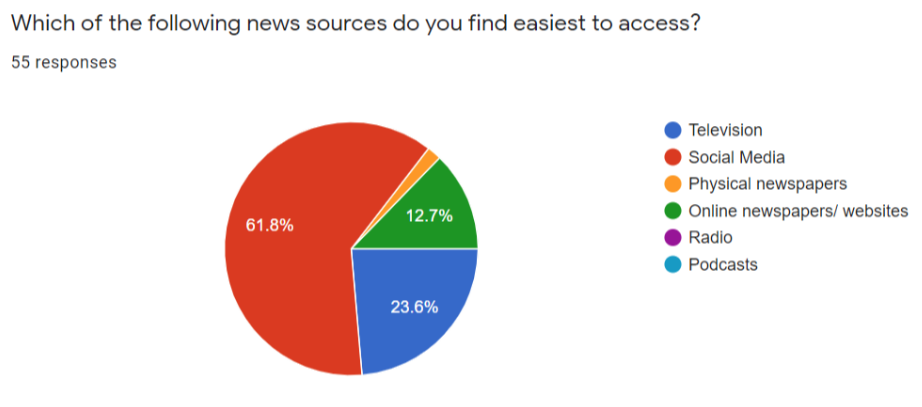



Recent Comments